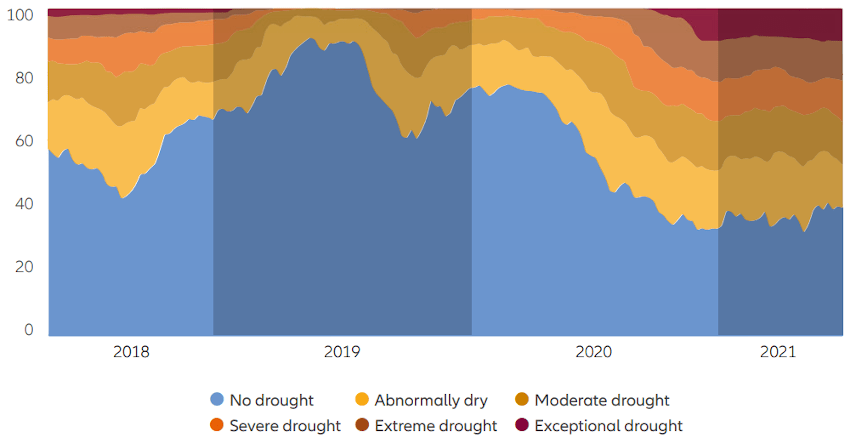
Summary
The US experienced its worst recorded drought in decades this summer. At its height, the unprecedented aridity extended across more than two-thirds of the continental area of the United States, with its most severe manifestations in the Southwest, but also extending to Oregon, Washington and North Dakota.
US record ‘megadrought’, a menace to food security
This historic drought is the consequence not only of a major heatwave, but also of less rain and snowfall in the winter and spring. In addition to dangerous and devastating fires, this longstanding dry spell produced disruptive effects on the US food supply, as California – the primary producer of fruits, nuts and vegetables in the US – experienced severe drought across 93% of the state.
Even though California and other states have started to implement countermeasures, large-scale investment is still required to improve both urban and agricultural water use, in order to ensure adequate water supply and sanitation across the nation.
Once again, we see how water scarcity continues to threaten life as we know it, compelling us to take action, and to start doing more with less water supply.
This is all the more true given that ongoing climate change is likely to make this type of severe weather even more frequent, rendering the need for action that much more pressing.
Cyclical weather patterns vs extreme weather events
Droughts are produced by years of dry conditions, and while California and other southwestern states are predisposed to cyclical weather patterns, with periods of dry years and periods of wet years, climate change and rising temperatures are turning cyclical shifts into prolonged periods of drought and severe water crises.
Persistent Drought Affects More Than Half of US
Percentage share of the continental United States’ area under different levels of drought (2018-2021)

Source: Statista/US Drought Monitor by USDA/NOAA/University of Nebraska
According to scientific analysis,1 similar extreme and prolonged weather phenomena, resulting from climate change and rising temperature, are likely to become the “new normal”, and will occur with higher frequency, causing even more disastrous consequences.
Echoing these estimations, a recent study found that we are on track to experience the worst drought in 1,200 years.
|
As of August 2021, Lake Mead, the largest reservoir in the U.S., was filled to only about one-third of its designed capacity – the lowest water level since it was formed in 1935. Next year, at the latest, this decline will lead to substantial water delivery cutbacks for Arizona, Nevada and Mexico, and will directly affect the water supply to adjacent farmlands.² |
Consequences of drought: fuelling fires and disrupting food supply
The megadrought comes with both environmental and social consequences. The drier conditions fuel a more severe fire season. By the end of June 2021, more than 30,000 wildfires had affected over 1.4 million acres, the highest level recorded for this time of year since 2011.
In addition to life-threatening fires, the drought has the potential to disrupt agricultural production. California is responsible for two-thirds of U.S. fruit and nut production, and about one-third of vegetable production. Given the water-intensive nature of agriculture, it will be impossible to support the usual production levels. Many farmers have already left large areas of cropland unplanted, especially those farmers producing water-intensive crops such as almonds. In rural areas wells are running dry, jeopardising access to fresh water and sanitation. Today more than one million residents still don’t have access to fresh drinking water in California. All of this points to a huge need for water investment to improve urban and agricultural use of water.
The cost side of climate-change-related disasters
Extreme weather events and prolonged droughts directly and indirectly impact livelihoods and economic sectors, as both are strongly dependent on water.
Droughts and mega heatwaves:
- put at risk public water supplies
- negatively impact biodiversity
- damage infrastructure
- harm human health
- reduce energy production.
This type of weather also typically results in increased electricity demand, given the need for air conditioning. This can have cascading effects on economic systems.
Looking at the economic losses caused by climate-change-related disasters, from 1980 to 2021 the U.S. had to contend with average annual costs of USD 45.4 billion.3
From 2020 to 2021, the National Centers for Environmental Information counted thirty separate USD 1 billion disasters, that cost the lives of nearly 600 people, and triggered expenditures amounting to over USD 128 billion.4
Billion-dollar events to affect the United States from 2020 to 2021 (CPI-Adjusted)

Source: NOAA National Centers for Environmental Information (NCEI) U.S. Billion-Dollar Weather and Climate Disasters (2021).
On a global level, between 1970 and 2019 climate and water hazards accounted for 74% of all reported economic losses.5
Allianz Global Investors: helping to address growing water scarcity risks
We look at companies helping society do more with less water supply. While climate-change related drought conditions require significant long-term environmental action, companies producing technologies that help increase the water efficiency of farming can have a big impact. Centre pivot and drip irrigation can result in significant water improvements – with centre pivot irrigation technology enhancing water efficiency by up to 95%.
AllianzGI continues to identify and invest in these innovators that help to increase the efficiency and sustainability of water irrigation systems and to conserve valuable resources, and agricultural players, which can help farmers continue to produce fruits, nuts and vegetables with a much smaller water footprint. Outside of agriculture, improved wastewater management and recycling can also have an impact, with many of companies offering industry- leading solutions to facilitate improvements. We continue to seek out solution providers, helping to direct capital to the most pressing water-related environmental and social challenges.
Find out more about sustainable investment at Allianz Global Investors here:
1 https://science.howstuffworks.com/nature/natural-disasters/western-us-drought-news.htm
2 https://eu.azcentral.com/story/news/local/arizona-environment/2021/04/30/arizona-preparing-cutbacks-colorado-river-water-amid-drought/7401706002/
3 https://www.bloomberg.com/news/articles/2021-07-01/summer-is-already-off-to-a-wild-start-because-of-climate-change
4 https://www.ncdc.noaa.gov/billions/summary-stats
5 https://public.wmo.int/en/media/press-release/water-related-hazards-dominate-disasters-past-50-years
7 reasons to stay invested in China equities

Summary
Although recent news out of China has understandably unsettled the markets, we don’t think it changes the long-term investment case. Volatility goes hand in hand with China’s higher long-term return potential. Understanding the dynamics at play can help make these changes easier to take in stride.
-
Investing involves risk. The value of an investment and the income from it will fluctuate and investors may not get back the principal invested. Past performance is not indicative of future performance. This is a marketing communication. It is for informational purposes only. This document does not constitute investment advice or a recommendation to buy, sell or hold any security and shall not be deemed an offer to sell or a solicitation of an offer to buy any security. The views and opinions expressed herein, which are subject to change without notice, are those of the issuer or its affiliated companies at the time of publication. Certain data used are derived from various sources believed to be reliable, but the accuracy or completeness of the data is not guaranteed and no liability is assumed for any direct or consequential losses arising from their use. The duplication, publication, extraction or transmission of the contents, irrespective of the form, is not permitted.
This material has not been reviewed by any regulatory authorities. In mainland China, it is for Qualified Domestic Institutional Investors scheme pursuant to applicable rules and regulations and is for information purpose only. This document does not constitute a public offer by virtue of Act Number 26.831 of the Argentine Republic and General Resolution No. 622/2013 of the NSC. This communication's sole purpose is to inform and does not under any circumstance constitute promotion or publicity of Allianz Global Investors products and/or services in Colombia or to Colombian residents pursuant to part 4 of Decree 2555 of 2010. This communication does not in any way aim to directly or indirectly initiate the purchase of a product or the provision of a service offered by Allianz Global Investors. Via reception of his document, each resident in Colombia acknowledges and accepts to have contacted Allianz Global Investors via their own initiative and that the communication under no circumstances does not arise from any promotional or marketing activities carried out by Allianz Global Investors. Colombian residents accept that accessing any type of social network page of Allianz Global Investors is done under their own responsibility and initiative and are aware that they may access specific information on the products and services of Allianz Global Investors. This communication is strictly private and confidential and may not be reproduced. This communication does not constitute a public offer of securities in Colombia pursuant to the public offer regulation set forth in Decree 2555 of 2010. This communication and the information provided herein should not be considered a solicitation or an offer by Allianz Global Investors or its affiliates to provide any financial products in Brazil, Panama, Peru, and Uruguay. In Australia, this material is presented by Allianz Global Investors Asia Pacific Limited (“AllianzGI AP”) and is intended for the use of investment consultants and other institutional/professional investors only, and is not directed to the public or individual retail investors. AllianzGI AP is not licensed to provide financial services to retail clients in Australia. AllianzGI AP is exempt from the requirement to hold an Australian Foreign Financial Service License under the Corporations Act 2001 (Cth) pursuant to ASIC Class Order (CO 03/1103) with respect to the provision of financial services to wholesale clients only. AllianzGI AP is licensed and regulated by Hong Kong Securities and Futures Commission under Hong Kong laws, which differ from Australian laws.
This document is being distributed by the following Allianz Global Investors companies: Allianz Global Investors GmbH, an investment company in Germany, authorized by the German Bundesanstalt für Finanzdienstleistungsaufsicht (BaFin); Allianz Global Investors (Schweiz) AG; in HK, by Allianz Global Investors Asia Pacific Ltd., licensed by the Hong Kong Securities and Futures Commission; in Singapore, by Allianz Global Investors Singapore Ltd., regulated by the Monetary Authority of Singapore [Company Registration No. 199907169Z]; in Japan, by Allianz Global Investors Japan Co., Ltd., registered in Japan as a Financial Instruments Business Operator [Registered No. The Director of Kanto Local Finance Bureau (Financial Instruments Business Operator), No. 424], Member of Japan Investment Advisers Association, the Investment Trust Association, Japan and Type II Financial Instruments Firms Association; in Taiwan, by Allianz Global Investors Taiwan Ltd., licensed by Financial Supervisory Commission in Taiwan; and in Indonesia, by PT. Allianz Global Investors Asset Management Indonesia licensed by Indonesia Financial Services Authority (OJK).








